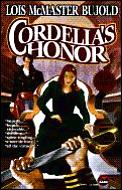
| Series: | Vorkosigan #2 |
| Publisher: | Baen |
| Copyright: | 1991 |
| Printing: | November 1996 |
| ISBN: | 0-671-87749-6 |
| Format: | Trade paperback |
| Pages: | 273 |
I read this book as the second half of the Cordelia's Honor omnibus, which is what the sidebar information is for.
This is basically the second half of Shards of Honor, and I'm glad that I didn't just skip past that book to read this one, since the background really is necessary to understand what's going on.
It's also a significantly better book in pretty much every possible way.
My big complaint about Shards was the shallow characterization, and this has been dealt with in Barrayar quite well. From the first few pages, I had a much better feel for the motives and emotional states of the characters than I ever had before. As the plot unfolded, I was actually shown their reactions rather than just told about them. I'm not sure exactly what the difference was; maybe it was just more time spent on the characters. But it made a huge difference.
The plot is also much improved, involving some real subtlety and much more believability. Rather than wandering around the galaxy skipping through the events of Cordelia's life, this book settles down for some serious political intrigue, assassination attempts, and civil war. Cordelia struggles to understand Barrayar society while starting a family and getting deeply involved in her husband's political dangers, and there is an excellent scene near the end of the book when she decides to seriously kick butt. This book had more true characters, the circumstances seem far less contrived and arbitrary, there's a fair bit of tension, and the book ends in a nice climax and denouement, something mostly missing from Shards.
Unfortunately, there are still some serious problems. Mainly, the foundation is still the same shaky one built in the first book, and occasionally it shows through in notable ways that threw me out of the suspension of disbelief. The Barrayaran culture still doesn't make a great deal of sense, although this book tries a lot harder than Shards to flesh it out. The Betan culture is basically an incoherent hodge-podge, and the points where Cordelia is supposedly homesick feel the most artificial of any of the character emotions to me, returning to surface telling that isn't very credible. It makes me wonder if Bujold was trying to write in homesickness but couldn't quite make herself believe it, since there just wasn't ever enough to Betan society to actually miss.
Occasionally, there are glaring omissions in the overall background that crop up and make me wonder about the world. For example, Cordelia was supposedly on relatively okay terms with her mother. What ever happened with that, particularly in a book so concerned with parents and children? Did she have no friends at all from her years in Beta Colony that she would even miss? Or that would ever try to contact her? What of the diplomacy and politics of having her very publicly on Barrayar? None of this is dealt with at all, and while I didn't notice it that much while reading the story, it started occurring to me later and making me feel like Bujold was just dropping parts of the background that didn't work well or that she didn't know how to handle.
Also bothering me, but perhaps more unique to me, is some of Cordelia's irreverant sense of humor. Occasionally this is pointed and highly amusing, but it quite frequently seems to descend into flippant comments and cutsey analogies that belittle the characters and world and that really started to grate. It's better again in Barrayar than in Shards of Honor, but still quite annoying. It's a believable character trait, but I would have liked it better if occasionally one of the other characters would have taken her to task for it, or if she'd ever ended up on the wrong end of an argument. (There's still a fair bit of the too-perfect aura of self-insertion hovering around Cordelia in places.)
I'm not sure if Barrayar makes reading Shards of Honor worth it or not, and taken together as one work it's still a fairly mediocre book. I can't say I agree with the Hugo award either (although I don't know what it was up against). But Barrayar is at least a much better book with some moments I really enjoyed, and on it's own I would recommend it with reservations.
Followed in series chronological order by The Warrior's Apprentice.
Reviewed: 2004-04-05